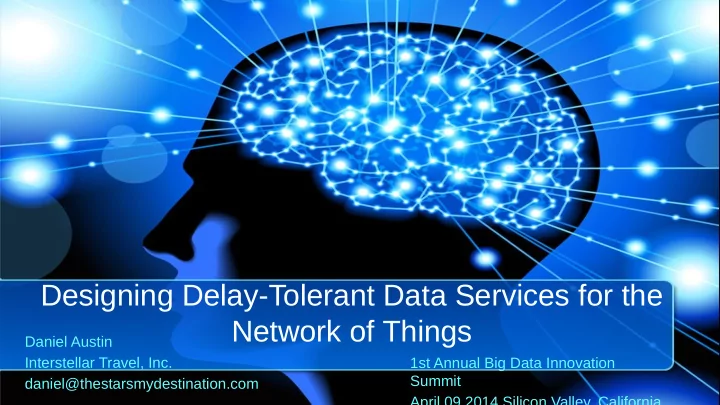

Designing Delay-Tolerant Data Services for the Network of Things Daniel Austin Interstellar Travel, Inc. 1st Annual Big Data Innovation Summit daniel@thestarsmydestination.com April 09 2014 Silicon Valley, California
Big Ideas for Today’s Talk The Internet of Things is Coming Delay-Tolerant Networking for the NoT Big Data is Key to Networking Millions of Small Devices Adoption will be Driven by Evolution of the Social Issues
The Network of Things “If we had computers that knew everything there was to know about things – using data they gathered without any help from us – we would be able to track and count everything, and greatly reduce waste, loss and cost. We would know when things needed replacing, repairing or recalling…” -Kevin Ashton, 1989
A Day in the Connected Life …”a system where the Internet is connected to the physical world via ubiquitous sensors…”
Characteristics of the Network of Things • Many small messages • Intermittent transmission • Connectionless • Stateless • No guaranteed delivery • Lazy/No Acknowledgements • Mesh architectures based on proximity • Mixed/variable security
Service Types for the Network of Things • Proximity – Identity – Authorization/Eligibility – History – Personalization • Location • Companions/Presence • Service Discovery • Ordering/Billing/Payments
WPAN (NoT) Protocols • IEEE 802.15.4 was designed for wireless PANS – ZigBee and other protocols • 6LowPAN (RFC 6282) describes how to route IPv6 over 802.15.4 networks • Problems with IPv6 & NoT – IPv6 requires minimum MTU of 1280 bytes – Far too large for IoT messages – Overhead for addressing ~ 40 bytes of IPv6 + 20 bytes for TCP – IP designed for bulk data transport – Congestion is not an issue for the NoT!
Bluetooth Low Energy vs 6LowPAN BLE 6LowPAN • • Range = 100m Range = 20m • • Security = 128-bit AES Security = 128-bit AES • • MSG SZ = 128 octets MSG SZ = 127 octets • • BLE 4.0 protocol IPv6 over 802.15 • • Clean separation of BLE protocol stack from TCP/IP Mixed protocol stack
Delay-Tolerant Networking • TCP/IP Assumptions: – End-to-End connection – Short, fixed delays – Symmetric data rates – Low error rates – Some knowledge of existing network • DTNs originated at NASA for interplanetary communications (RFC 4838 & 5050) – Applies to all intermittently connected scenarios, including the NoT
How DTNs Work TCP/IP DTN Source; DTN SIG
DTNs: From Cars to Interplanetary Networks Source; DTN SIG
CAP Theorem & DTNs Source: DTN SIG
Big Data and the Network of Things • Many Small Devices = Big Data • Consistency, Availability, and (network) Partition take on new meanings in the NoT – DTNs weaken CAP assumptions – Consistency can’t easily be checked • Big Data, NoT, and Security – Not based on encryption – Anonymity through disaggregation
Are You a Big Data Problem? • Each person will generate roughly 20 petabytes of data over the course of a lifetime – Users have little control over collection and storage – Email, documents, receipts, bills (!), your car, music, books… • Pervasive computing multiplies the problem – Majority of data valueless out of context – Security & Privacy concerns • Networks of Things instead of ‘Internet of Things’ – Security by data partition
Ubiquitous/Anonymous Peering Patterns • Peer-to-peer • Low levels of security • Resilient to network partitions • Proximity based – no identity • Good for service discovery
Client/Server Patterns • Clients transmits to one server • Higher Security • Requires server asymmetry • Can offer additional services – History – Personalization – Identity
Design Rules for Data Services • Security & Privacy First!! • Delay tolerance required • Idempotent/stateless • Messages vs. Request/Response • Anticipate Maximum Mesh • Batched/Bundled vs. Event-Driven
Big Takeaways • IoT <-> DTNs <-> Big Data – pervasive = invasive ? – Evolution of Big Data Depends on the IoT • Delay-tolerance for mobile networks – Realistic assumptions – CAP theorem, store-and-forward consistency – Online/offline distinction is blurring • Only expect partial adoption, based on loose aggregations – ‘Networks of Things’ vs. ‘Internet of Things’
By 2020 everyone, everything and everywhere will be connected in real time. More than 50 billion connected devices will be used in the Networked Society. Source: http://www.ericsson.com/thinkingahead/networked_society
Thank You! Designing Delay-Tolerant Data Services for the Network of Things Daniel Austin Interstellar Travel, Inc. 1st Annual Big Data Innovation Summit daniel@thestarsmydestination.com April 09 2014 Silicon Valley, California
Recommend
More recommend